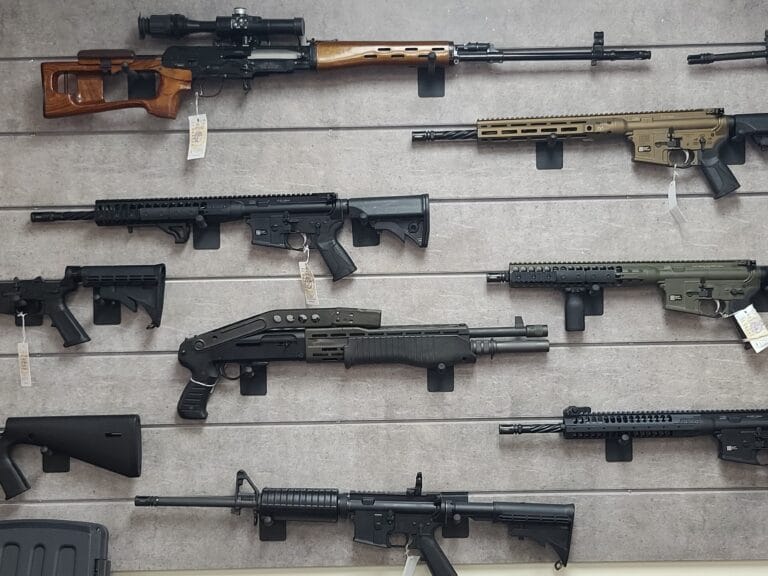The legal fight over Oregon’s gun-control ballot initiative is headed in two different directions, but the paths will eventually have to crash back into each other.
In the wake of Measure 114’s adoption last month, gun-rights advocates filed multiple lawsuits against the permit-to-purchase and magazine ban provisions at the state and federal levels. They argued both provisions are unconstitutional under the right to keep and bear arms protections in the United States Constitution and the Oregon Constitution, especially under the standard articulated by the Supreme Court in New York State Rifle and Pistol Association v. Bruen. But they got different results at each level.
Harney County Judge Robert Raschio issued a Temporary Restraining Order (TRO) against the entirety of the law. U.S. District Judge Karin Immergut delayed implementation of the permit-to-purchase requirement for a month at the request of Oregon officials, who admitted they couldn’t create the system before the deadline but declined to issue a TRO against the rest of Measure 114.
The judges’ reasoning were in stark contrast to one another. While they both agreed that requiring a permit to buy a gun that was effectively unobtainable violates the right to keep and bear arms, and the requirement would have to be blocked, at least in the short term, they differed on everything else. It’s possible either judge could change their mind, but they both seem pretty convinced of their initial conclusions. It’s more likely higher courts, likely the United States Supreme Court itself, will have to settle the contradictions in their approach–if not in this specific case, at least more generally.
Judge Immergut found Measure 114’s ban on the sale and use of magazines capable of holding more than ten rounds, with limited exceptions, is not unconstitutional. She argued the Second Amendment does not protect the magazines because they are not “necessary to the use of firearms for lawful purposes such as self-defense” since magazines that hold fewer than ten rounds can be used in their place.
“While magazines in general are necessary to the use of firearms for self-defense, Plaintiffs have not shown, at this stage, that magazines specifically capable of accepting more than ten rounds of ammunition are necessary to the use of firearms for self-defense,” Immergut wrote. “As noted above, the ‘corollary… right to possess the magazines necessary to render… firearms operable’ is ‘not unfettered.’ Instead, the right is limited to magazines that are necessary to render firearms operable for self-defense and other lawful purposes.”
Further, she argued magazines that hold more than ten rounds are not commonly used for self-defense. Instead, she claimed they are frequently used to carry out mass shootings. She determined the magazines weren’t in common use for self-defense (which she narrows “lawful” uses down to) because a review of NRA-cataloged self-defense shootings rarely involved more than ten shots. Conversely, she claimed they were especially dangerous because of their use in mass shootings–not the shot count involved.
Further, since neither multi-shot firearms nor mass shootings were common during the founding era, Immergut concludes the Bruen decision gives her more leeway to look for broad historical analogues to the modern solutions for what she claims are the connection between the two. She quotes the Court as saying, “the Second Amendment is not a ‘regulatory straightjacket’ that protects a right to ‘keep and carry any weapon whatsoever in any manner whatsoever and for whatever purpose’ while leaving off the part where it said it’s not a “regulatory blank check.”
While unable to find any founding-era regulation that resembles a magazine capacity limit, Immergut pointed to a mixed bag of various 18th and 19th-century weapon regulations. She argued things like historical bans on carrying clubs or bowie knives or even forming private militias constitute a comparable burden to Measure 114’s magazine ban. So, she argued, the ban survives a Bruen analysis.
“In light of the evidence of the rise in mass shooting incidents and the connection between mass shooting incidents and large-capacity magazines—and absent evidence to the contrary regarding the role of large-capacity magazines for self defense—Defendants are comparably justified in regulating large-capacity magazines to protect the public,” she wrote.
Judge Immergut’s arguments don’t seem to line up well with what the Supreme Court has ruled from Heller through Caetano and Bruen. The Court has been clear that the Second Amendment protects arms commonly used for lawful purposes. It’s difficult to imagine the magazines that come standard with the majority of guns sold over the past century or more, likely numbering in the hundreds of millions, are anything other than that.
Self-defense may be the most essential lawful use, but it’s obviously not the only one. And the Supreme Court has established this extends well beyond firearms themselves to devices like stun guns, which it found were in common use with only a few hundred thousand nationwide.
And Judge Immergut’s historical analysis looks more like an effort to throw every historical gun regulation imaginable at the wall in hopes of something sticking rather than an opinion that’s likely to have staying power and influence rulings beyond her own. That’s especially true with the section that quite literally treats the Second Amendment as lesser than the First, a recurrence of the tendency of lower courts to treat gun rights as “second class” that the Supreme Court explicitly condemned in Bruen.
“Plaintiffs’ briefing and oral argument with respect to irreparable harm focused almost exclusively on their Second Amendment challenge to Measure 114,” she wrote. “Plaintiffs ask this Court to hold that the deprivation of Second Amendment rights alone, even for an instant, constitutes irreparable harm. Although First Amendment violations—even those that occur for ‘minimal periods of time’—are presumed to be irreparable, neither the Supreme Court nor the Ninth Circuit have explicitly extended that holding to the Second Amendment.”
The Supreme Court is unlikely to look fondly on that conclusion. Certainly, Judge Raschio disagreed.
“Deprivation of fundamental Constitutional Rights for any period constitutes irreparable harm,” he ruled.
He also found magazines banned by Measure 114 are commonly-owned.
“The plaintiffs are persuasive that magazines are protected by the Oregon constitution, and firearms containing fixed magazines that can hold ten bullets or more are in common use within Oregon,” he said in his ruling from the bench.
He said the magazine ban represented a clear violation of the state’s right to keep and bear arms protections. And the permit-to-purchase requirement does the same.
“Absent entry of this Temporary Restraining Order, Plaintiffs will be deprived of their right to bear arms pursuant to Or. Const. Art. 1, Sec. 27 by being made unable to lawfully purchase a firearm or bear a magazine holding more than ten rounds of ammunition in the state of Oregon,” Judge Raschio wrote.
Immergut’s argument on the permit-to-purchase requirement is considerably shorter but probably more viable than her opinion on the magazine ban. While the historical analogue test in Bruen makes it difficult to uphold the permitting law without zooming way out as Immergut did for the magazine ban, non-binding Supreme Court dicta does provide some support.
“Measure 114’s permit-to-purchase scheme is a ‘shall-issue’ permit scheme based on objective standards and is therefore presumptively constitutional under the holding of Bruen,” she wrote. “There are currently 43 states with some kind of ‘shall-issue’ licensing regime in place, under which ‘a general desire for self-defense is sufficient to obtain a [permit.]’ Of these licensing regimes, Bruen concluded that ‘nothing in our analysis should be interpreted to suggest the unconstitutionality of the 43 States’ ‘shall-issue’ licensing regimes.'”
She cited a Bruen concurrence by Justice Kavanaugh and Roberts that emphasized the apparent legality of “shall-issue” gun-carry permitting.
“Writing in concurrence, Justice Kavanaugh further noted that while discretionary regimes like the one at issue in Bruen are constitutionally suspect, ‘objective shall-issue licensing regimes’ do not violate the Second Amendment, even when they ask a prospective gun purchaser to ‘undergo fingerprinting, a background check, a mental health records check, and training in firearms handling and in laws regarding the use of force, among other possible requirements,'” she wrote.
Since the Court placed the right to carry guns on par with the right to own them in Bruen, it does stand to follow the Court may view permitting requirements on both similarly. So, even if there isn’t a direct historical analogue for permit-to-purchase laws or gun-carry licensing, the Court may uphold both. Of course, that only applies in cases where permitting is not controlled through subjective decisions and doesn’t impose unreasonable delays or costs.
Of course, this issue offers the more intriguing legal question, but we have less insight into what each judge thinks about it to this point. Judge Immergut gave us a few paragraphs dotted with disclaimers that she could change her mind based on evidence presented at the next hearing. Judge Roschio didn’t elaborate on the issue much in his TRO. That’s likely to change after each judge issues their ruling on requests for preliminary injunctions next week, and we get a few thousand more words.
It remains unlikely they will land in the same place. So, a higher court will eventually have to reconcile their points of view and declare a winner. Given this fight is taking place in the Ninth Circuit and they have traditionally been most at odds with SCOTUS, it might make it all the way to the highest court of all.
In the meantime, Oregonians aren’t waiting for that outcome. They have crammed into gun stores at record rates, perhaps understanding how long it can take to resolve legal fights like this. Of course, gun-rights advocates have something of an advantage in the end: they only have to win at one level.






2 Responses
Karin Immergut was a Trump nominee. But she was also a product of the Senate’s “blue slip” process, which means Oregon’s two Progressive Democratic Senators had veto power over her nomination.
Republicans enjoyed nominal control of the Senate during all four years of the Trump Administration. But because they never held more than a one- or two-vote working majority, there were real constraints on their power.
Immergut‘s opinion in OFF v. Brown is a stark reminder that every seat in Congress matters.
Yes, that’s a good point about how the judicial nomination process works in practice.